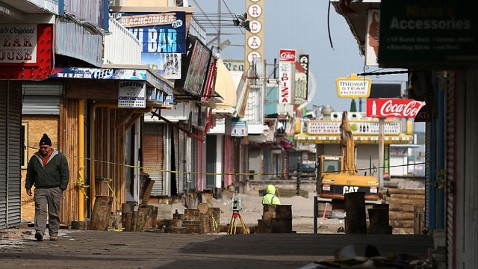Sequester at Home: Worries in Sandy-Struck New Jersey

(Image Credit: Mark Wilson/Getty Images)
Less than six months after Hurricane Sandy, New Jersey charities are gearing up for the next disaster: sequestration cuts.
A lot of uncertainty persists about how exactly organizations that provide for New Jersey's neediest will feel the cuts, but administrators are preparing for the worst. Some receive direct funding from the government but have not been told how much of that will be cut or when. All expect to be indirectly affected, burdened by the task of absorbing newly unemployed or underpaid government workers as well as making up for cuts to programs that support mothers, children and seniors.
The overall prediction is that already-strained budgets will suffer under the added strain.
READ MORE: How Sequestration's Automatic Budget Cuts Could Hurt on a Local Level
"We have not heard from lawmakers in terms of what to prepare or how to prepare," said Carlos Rodriguez, executive director of The Food Bank of Monmouth and Ocean Counties. "We're already stretched thin not only due to operation costs [that] are going up and the high demand of food. We're dealing with two storms here."
Those two storms were the economic recession and the fall's superstorm Sandy, according to Rodriguez.
New Jersey, legislators fought to wrangle rebuilding funds from Congress after the storm leveled homes and cut power across the state this fall. But about $2.5 billion of that hard-won aid is in danger of being washed away by sequester cuts, according to Sen. Bob Menendez, D-N.J.
After Sandy hit, New Community Corporation's Family Resource Center saw an influx of clients looking for housing assistance and other services. Now administrators expect sequester cuts will usher in a new group.
"We are doing our best. We have all of our program managers talking to the local people, but we are just in a no-man's land," Richard Rohrman, executive director at NCC, said of preparations for the cuts. "It's impossible for us to plan."
Certain initiatives - like Medicare services and troop salaries - have been protected from the sequester cuts. But need-based programs like the Supplemental Nutrition Program for Women, Infants and Children (WIC) are expected to be on the chopping block.
READ MORE: White House Previews Local Impacts of Sequester
The White House predicts 600,000 beneficiaries could be dropped from WIC, though a USDA official told ABC News that WIC cuts would not occur before the end of the month.
The White House also predicts 4 million seniors will stop receiving meals from federally-assisted programs.
"Politicians designed the sequestration cuts to be so harsh and unimaginable that they would never let them happen, so these things were designed to be hurtful, and the fact that they are now letting them come into play is just nothing short of tragic," said Bill Clark, executive director of Philabundance, an organization that provides food in the Delaware Valley, including parts of Southern New Jersey.
Kathleen DiChiara, who founded Community Food Bank of New Jersey out of the back of her car 40 years ago, expressed exasperation with the cuts to programs that help the country's most vulnerable populations.
"I mean can a baby go out and get another job," she asked. "Can a senior citizen in their eighties go out and find work to put food on the table?"
READ MORE: Bring on the Cuts - Some Want the Sequester
In December, Newark Mayor Cory Booker participated in a food stamp challenge to highlight the difficulty New Jersey residents receiving SNAP benefits face in planning their meals. Critics argued Americans should provide for their own nutrition.
Speaking to ABC News Thursday, DiChiara attacked the attitude that those depending on the government or charities for food were doing so out of laziness.
"When I was starting out in 1975, we talked about emergency food that people turned for to for help when there had been a major catastrophe in their life - a major illness, a job loss. Now the word doesn't make sense anymore, because it becomes supplementary, because people month-after-month can't get enough food to provide for their families," DiChiara said. "If you're earning minimum wage or even above that in this metropolitan area with the cost of housing, there just isn't the amount of money you need to buy a balanced diet."
Rohrman feared his organization will have to cut back on job training and drug counseling programs.
"All of these programs run at a break-even at best. Many of them require subsidy to keep them going, so it's not like there's any fat to be cut in these programs," Rohrman said. "For every dollar that we cut, we're going to have to make a dollar's worth of adjustment."
READ MORE: Start of Sequester Foresees Harm Beyond Staffing Cuts on Local, National Level
The New Community Corporation is celebrating its 45th year serving the New Jersey community this weekend. For Rohrman, these cuts mean time and money spent figuring out how to maintain that service without interruption, but they are not a death sentence.
"We've been through the ups and the downs, so we'll be able to figure out how to deal with it but there are a lot of organizations, I think, that … just don't have the backup that they need to get through this," Rohrman said. "I would think it's just a matter of months once the funds begin to slow down."